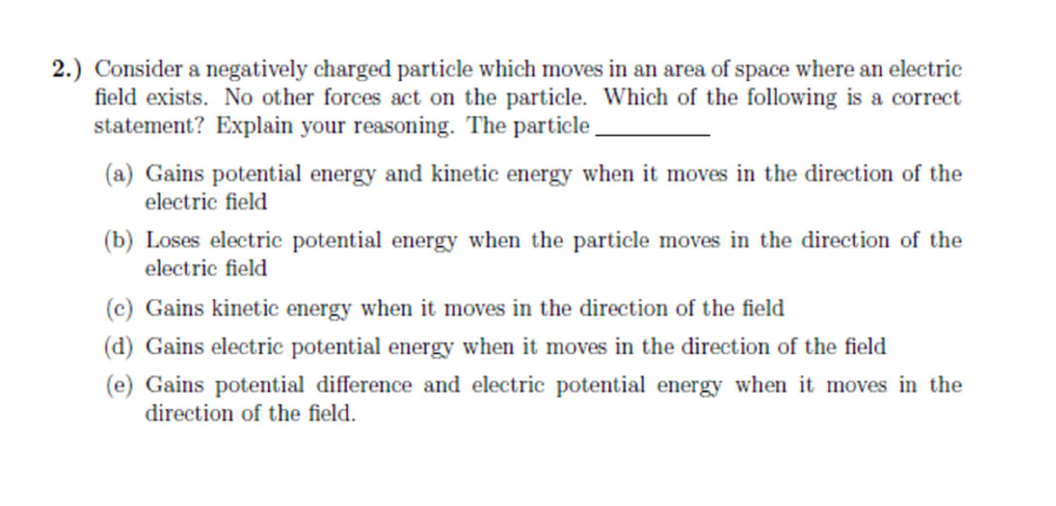2.) Consider a negatively charged particle which moves in an area of space where an electric field exists. No other forces act on the particle. Which of the following is a correct statement? Explain your reasoning. The particle (a) Gains potential energy and kinetic energy when it moves in the direction of the electric field (b) Loses electric potential energy when the particle moves in the direction of the electric field (c) Gains kinetic energy when it moves in the direction of the field (d) Gains electric potential energy when it moves in the direction of the field (e) Gains potential difference and electric potential energy when it moves in the direction of the field.
2.) Consider a negatively charged particle which moves in an area of space where an electric field exists. No other forces act on the particle. Which of the following is a correct statement? Explain your reasoning. The particle (a) Gains potential energy and kinetic energy when it moves in the direction of the electric field (b) Loses electric potential energy when the particle moves in the direction of the electric field (c) Gains kinetic energy when it moves in the direction of the field (d) Gains electric potential energy when it moves in the direction of the field (e) Gains potential difference and electric potential energy when it moves in the direction of the field.
College Physics
10th Edition
ISBN:9781285737027
Author:Raymond A. Serway, Chris Vuille
Publisher:Raymond A. Serway, Chris Vuille
Chapter16: Electrical Energy And Capacitance
Section: Chapter Questions
Problem 2CQ: An electron is released from rest in a uniform electric field. Determine whether the following...
Related questions
Question
Pls help ASAP

Transcribed Image Text:2.) Consider a negatively charged particle which moves in an area of space where an electric
field exists. No other forces act on the particle. Which of the following is a correct
statement? Explain your reasoning. The particle
(a) Gains potential energy and kinetic energy when it moves in the direction of the
electric field
(b) Loses electric potential energy when the particle moves in the direction of the
electric field
(c) Gains kinetic energy when it moves in the direction of the field
(d) Gains electric potential energy when it moves in the direction of the field
(e) Gains potential difference and electric potential energy when it moves in the
direction of the field.
Expert Solution
This question has been solved!
Explore an expertly crafted, step-by-step solution for a thorough understanding of key concepts.
This is a popular solution!
Trending now
This is a popular solution!
Step by step
Solved in 2 steps with 1 images

Recommended textbooks for you

College Physics
Physics
ISBN:
9781285737027
Author:
Raymond A. Serway, Chris Vuille
Publisher:
Cengage Learning

College Physics
Physics
ISBN:
9781305952300
Author:
Raymond A. Serway, Chris Vuille
Publisher:
Cengage Learning

Principles of Physics: A Calculus-Based Text
Physics
ISBN:
9781133104261
Author:
Raymond A. Serway, John W. Jewett
Publisher:
Cengage Learning

College Physics
Physics
ISBN:
9781285737027
Author:
Raymond A. Serway, Chris Vuille
Publisher:
Cengage Learning

College Physics
Physics
ISBN:
9781305952300
Author:
Raymond A. Serway, Chris Vuille
Publisher:
Cengage Learning

Principles of Physics: A Calculus-Based Text
Physics
ISBN:
9781133104261
Author:
Raymond A. Serway, John W. Jewett
Publisher:
Cengage Learning

Physics for Scientists and Engineers, Technology …
Physics
ISBN:
9781305116399
Author:
Raymond A. Serway, John W. Jewett
Publisher:
Cengage Learning

Physics for Scientists and Engineers: Foundations…
Physics
ISBN:
9781133939146
Author:
Katz, Debora M.
Publisher:
Cengage Learning

College Physics
Physics
ISBN:
9781938168000
Author:
Paul Peter Urone, Roger Hinrichs
Publisher:
OpenStax College